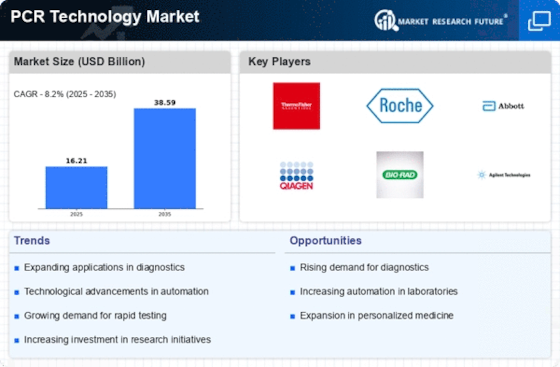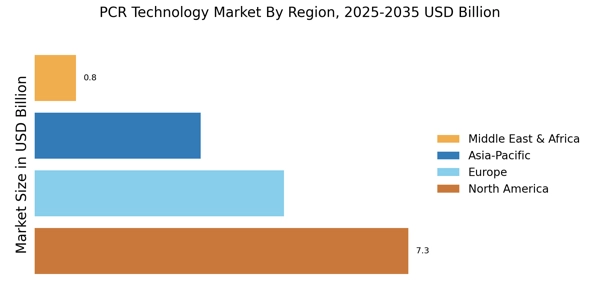Growing Awareness of Genetic Testing
There is a marked increase in awareness regarding the importance of genetic testing, which is positively impacting the PCR Technology Market. As individuals become more informed about genetic predispositions to diseases, the demand for genetic testing services is rising. PCR technology plays a pivotal role in these services, enabling accurate and efficient analysis of genetic material. The market for genetic testing is projected to grow significantly, with estimates suggesting it could reach 25 billion USD by 2027. This growing awareness and acceptance of genetic testing are likely to drive further adoption of PCR technology, reinforcing its significance in the healthcare landscape.
Rising Demand for Diagnostic Testing
The PCR Technology Market is experiencing a notable surge in demand for diagnostic testing, driven by the increasing prevalence of infectious diseases and genetic disorders. As healthcare systems prioritize rapid and accurate diagnostics, the adoption of PCR technology has become essential. According to recent data, the market for molecular diagnostics, which includes PCR, is projected to reach approximately 10 billion USD by 2026. This growth is indicative of the technology's critical role in disease detection and management, particularly in areas such as oncology and infectious disease testing. The PCR Technology Market is thus positioned to benefit from this rising demand, as healthcare providers seek efficient solutions to enhance patient outcomes.
Regulatory Support for Molecular Diagnostics
The PCR Technology Market is experiencing favorable regulatory support, which is crucial for the advancement of molecular diagnostics. Regulatory bodies are increasingly recognizing the importance of PCR-based tests in clinical settings, leading to streamlined approval processes for new diagnostic tools. This supportive environment encourages innovation and the introduction of novel PCR applications. Recent initiatives aimed at expediting the review of diagnostic tests are likely to enhance market growth. As regulatory frameworks evolve to accommodate advancements in technology, the PCR Technology Market stands to gain from increased accessibility and acceptance of PCR-based diagnostics, ultimately benefiting patient care.
Technological Advancements in PCR Techniques
Innovations in PCR technology are significantly influencing the PCR Technology Market. Recent advancements, such as digital PCR and multiplex PCR, are enhancing the sensitivity and specificity of tests, allowing for the simultaneous detection of multiple targets. These improvements are likely to expand the applications of PCR in various fields, including environmental monitoring and food safety. The introduction of automated systems and real-time PCR has also streamlined workflows, making testing more efficient. As a result, the PCR Technology Market is expected to witness substantial growth, with a projected compound annual growth rate of around 8% over the next few years, reflecting the ongoing evolution of PCR methodologies.
Increased Investment in Research and Development
The PCR Technology Market is benefiting from heightened investment in research and development across various sectors, including pharmaceuticals and biotechnology. This influx of funding is facilitating the exploration of novel applications for PCR technology, such as in personalized medicine and genetic research. As organizations strive to innovate and improve diagnostic capabilities, the demand for advanced PCR solutions is likely to rise. Reports indicate that R&D spending in the life sciences sector is expected to exceed 200 billion USD by 2025, underscoring the potential for growth within the PCR Technology Market. This trend suggests a robust future for PCR applications in both clinical and research settings.

















